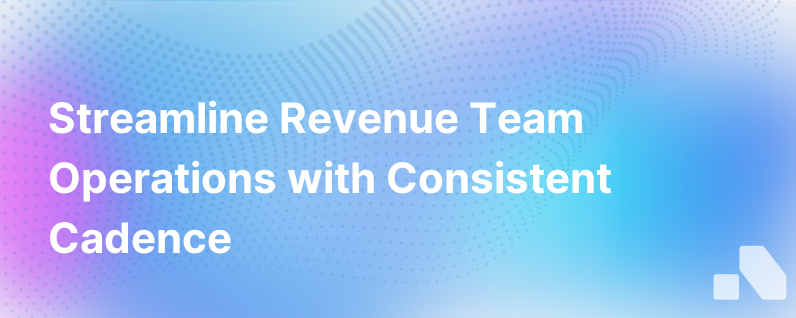
In today's competitive business environment, having a synchronized and effective revenue team is crucial. One key to achieving this is establishing a consistent operating cadence—a regular, rhythmic pattern of activities and meetings that aligns everyone's efforts and ensures progress toward key objectives. When your revenue team operates with a consistent cadence, it allows for clearer communication, better accountability, and more predictable results.
Here is a comprehensive guide to driving a consistent operating cadence across your revenue team.
Understanding Operating Cadence
Operating cadence refers to the pattern of regular, scheduled events such as meetings, check-ins, and reporting that keeps a team aligned and accountable. For the revenue team, it encompasses all the activities that tie into reaching revenue goals—like prospect orientation, lead nurturing, deal closures, account management, and customer upsells.
A well-implemented operating cadence creates a framework for action and decision-making that drives both day-to-day activities and strategic pursuits.
Benefits of a Consistent Operating Cadence
- Predictability and Stability: Regularly scheduled activities provide stability and predictability in operations which breed confidence among team members.
- Enhanced Communication: It fosters open communication channels ensuring that everyone is up-to-date and on the same page.
- Strategic Focus: A fixed cadence helps keep the team focused on strategic goals, as opposed to being lost in the day-to-day reactive mode.
- Agility and Adaptability: Regular check-ins allow the team to adapt quickly to changes in the market or shifts in strategy.
- Improved Performance Tracking: Consistent meeting schedules ensure that progress is reviewed regularly, making it easier to track performance against key metrics.
Building Blocks of a Revenue Team’s Operating Cadence
The operating cadence for a revenue team typically combines various elements:
- Daily Huddles: These are short, stand-up meetings to set the agenda for the day, identify any immediate concerns, and share quick updates.
- Weekly Team Meetings: These longer sessions are meant for more in-depth discussions on progress, challenges, strategies, and learning opportunities.
- Bi-weekly One-on-Ones: Regular individual catch-ups between managers and team members can be used for personal coaching or discussing career development.
- Monthly Reviews: Monthly meetings help summarize activities, review the outcomes, and plan for the next set of goals.
- Quarterly Business Reviews (QBRs): A strategic overview analyzing the past quarter and setting clear objectives for the next one.
How to Establish Your Team’s Operating Cadence
Here's how to roll out an effective operating cadence for your revenue team:
1. Define Key Cadence Activities
- Identify the necessary activities, both strategic and tactical, that drive revenue growth.
- Determine the frequency for each activity (daily, weekly, monthly).
- Align the activities with your sales cycle and customer journey.
2. Schedule with Purpose
- Assign specific days and times that work best for the team and stick to them.
- Ensure that each scheduled event has a clear agenda and a defined purpose.
3. Standardize Agendas and Templates
- Create standard agenda templates for different types of meetings.
- Implement uniform reporting templates for consistency in how data is presented and interpreted.
4. Enforce Discipline
- Make attendance mandatory for all cadence activities.
- Begin and end meetings on time, every time.
- Establish accountability for follow-through on action items and decisions.
5. Foster a Culture of Preparedness
- Encourage team members to come prepared to each cadence activity.
- Distribute relevant materials well in advance of meetings.
6. Integrate Tools and Technology
- Utilize CRM systems to schedule and track cadence events.
- Employ collaborative tools to keep everyone updated and connected.
7. Promote Transparency and Openness
- Encourage honest communication during meetings.
- Make sure tracking and performance data is accessible to relevant team members.
8. Review and Optimize
- Regularly assess the effectiveness of your operating cadence.
- Review meeting structures, frequency, and participation to ensure they remain optimal.
9. Lead by Example
- Leaders should exemplify punctuality, preparedness, and participation.
- Reinforce the importance of the operating cadence at every opportunity.
10. Celebrate Success and Learn from Failures
- Recognize accomplishments and milestones achieved through the operating cadence.
- Address shortfalls openly and adjust strategies as needed.
Challenges to Maintaining a Consistent Cadence
While a consistent operating cadence is the goal, it’s important to acknowledge and prepare for challenges:
- Team Resistance: Change is often met with resistance. Address concerns and demonstrate the value of a consistent operating cadence.
- Scheduling Conflicts: With multiple priorities, finding a time that works for everyone can be difficult. However, prioritizing these meetings is essential.
- Over-Meeting: There's a risk of having too many meetings that can become counterproductive. Ensure each session has a distinct purpose.
Conclusion
Crafting and adhering to a consistent operating cadence is vital for driving team alignment, focus, and accountability. It turns strategy into regular action and enables the revenue team to work as a cohesive unit pursuing common goals.
Implementing this structure won't happen overnight—it requires commitment, leadership, and continuous optimization. However, once a reliable cadence is established and maintained, you'll likely see a more disciplined approach to reaching your revenue objectives, allowing your B2B startup to thrive in an ever-evolving marketplace. With the right tools and attitude, your team's revenue-generating engine will run like a well-oiled machine, delivering sustained, measurable results.